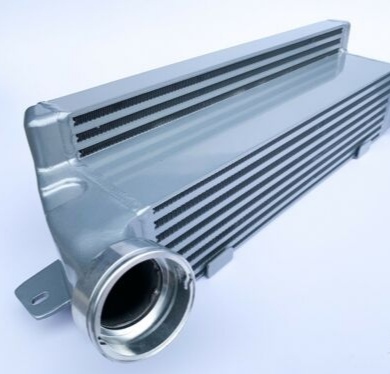Aluminum Intercoolers: Essential Components for High-Performance Engines
2025-03-21
When it comes to enhancing engine performance, especially in turbocharged or supercharged vehicles, the intercooler plays a pivotal role in ensuring optimal engine efficiency. Among the various types of intercoolers available, aluminum intercoolers have gained significant attention due to their effectiveness and durability. In this blog, we will explore what an aluminum intercooler is, why it's an essential part of high-performance engines, and how it contributes to improving vehicle performance.
What is an Aluminum Intercooler?
An intercooler is a heat exchanger used to cool the air compressed by a turbocharger or supercharger before it enters the engine's intake system. When air is compressed, it heats up, and hot air can reduce the density of oxygen, which negatively impacts combustion efficiency. An intercooler cools the compressed air, increasing its density and allowing for a more efficient combustion process. This results in better engine performance, higher power output, and improved fuel efficiency.
Aluminum intercoolers, specifically, are intercoolers made from aluminum, a material chosen for its combination of lightweight properties and excellent heat dissipation capabilities. Aluminum’s high thermal conductivity ensures that the air passing through the intercooler is efficiently cooled, enabling the engine to run at optimal temperatures and improve overall performance.
Why Choose an Aluminum Intercooler?
1. Superior Heat Dissipation
One of the standout features of aluminum intercoolers is their exceptional heat dissipation properties. Aluminum is highly effective at transferring heat, which allows it to cool the compressed air rapidly. The ability to remove excess heat from the intake air ensures that the engine operates at a lower temperature, preventing issues such as knocking or overheating. By keeping the air charge cooler, aluminum intercoolers help maintain engine efficiency and performance, even under heavy loads or high-speed driving conditions.
2. Lightweight Design
The lightweight nature of aluminum makes it an ideal material for intercoolers. The reduction in weight helps improve overall vehicle performance, particularly in sports and performance cars, where weight reduction is a critical factor. Aluminum intercoolers are much lighter than their counterparts made from other metals, which can contribute to improved acceleration, handling, and fuel efficiency. In motorsports, every pound matters, and a lightweight aluminum intercooler can offer a noticeable improvement in performance.
3. Durability and Corrosion Resistance
Aluminum is highly resistant to corrosion, making it a durable choice for intercoolers, which are often exposed to moisture, road salt, and other harsh environmental factors. This corrosion resistance ensures that aluminum intercoolers maintain their structural integrity and performance over time, even in challenging driving conditions. Whether you’re driving through rain, snow, or extreme temperatures, an aluminum intercooler can withstand these conditions without compromising its ability to cool the intake air.
4. Enhanced Performance and Efficiency
By cooling the intake air, aluminum intercoolers significantly improve engine performance. Cooler air is denser, meaning that it contains more oxygen molecules per unit of volume, which results in more efficient combustion. With an aluminum intercooler, engines can run at higher boost pressures, generating more power without the risk of knocking or detonation. This enhanced performance is especially beneficial in high-performance applications, such as racing, where every bit of power counts.
In addition, aluminum intercoolers help improve fuel efficiency. Since the engine burns fuel more efficiently with cooler intake air, it requires less fuel to achieve the same power output. This can lead to noticeable improvements in fuel economy, especially in vehicles that are frequently driven in high-performance conditions.
5. Customizability
Aluminum intercoolers are highly customizable, allowing them to be tailored to fit specific vehicle models and performance requirements. Manufacturers offer various sizes, shapes, and configurations, ensuring that the intercooler can be designed to provide optimal airflow and cooling for a particular engine setup. Whether you’re building a custom turbocharged system or upgrading your vehicle’s existing intercooler, aluminum intercoolers can be easily adapted to suit your needs.
6. Improved Reliability in High-Performance Applications
In high-performance applications, such as racing or off-roading, engines are often subjected to extreme conditions that can put a strain on components. Aluminum intercoolers offer reliability and can withstand the demands of high-speed driving or heavy load conditions. The material’s strength and ability to dissipate heat efficiently help ensure that the intercooler performs consistently, even in challenging environments.
How Do Aluminum Intercoolers Work?
The primary function of any intercooler is to cool the air after it is compressed by the turbocharger or supercharger. Here’s a quick breakdown of how aluminum intercoolers work:
1. Compressed Air Enters the Intercooler: The turbocharger or supercharger compresses the incoming air, which causes the air to heat up. This heated, pressurized air then enters the intercooler.
2. Air Passes Through the Core: Inside the intercooler, the compressed air flows through a series of fins or tubes, which are designed to maximize surface area and promote heat exchange.
3. Heat Dissipation: As the hot air passes through the intercooler, the aluminum material absorbs the heat. The heat is then dissipated into the surrounding environment via airflow through the intercooler’s core.
4. Cooler Air Exits the Intercooler: Once the air has been cooled, it exits the intercooler and enters the engine’s intake system. The cooler air is denser, providing more oxygen for combustion and improving engine efficiency.
Conclusion
Aluminum intercoolers are essential components in the performance world, offering superior heat dissipation, lightweight design, durability, and enhanced engine efficiency. Whether you’re upgrading your car for daily driving or preparing it for high-performance motorsports, an aluminum intercooler can make a significant difference in how well your engine performs. By keeping intake air cool, aluminum intercoolers help prevent engine overheating, reduce the risk of detonation, and improve overall power output and fuel efficiency.
If you’re looking to boost your vehicle’s performance, consider investing in a high-quality aluminum intercooler — it’s an effective and reliable solution for anyone serious about optimizing engine performance.



